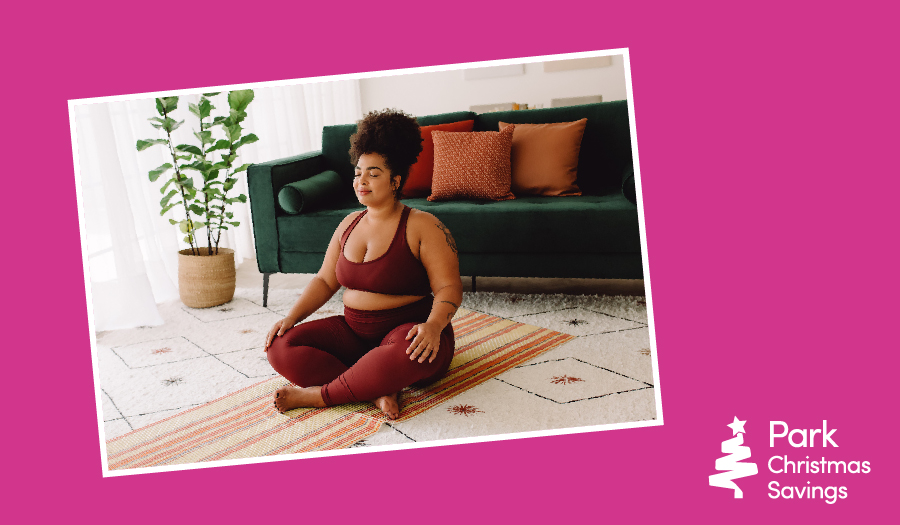
Stress Awareness Month 2023: Meditation to Relieve Stress
As April is Stress Awareness Month, Park HQ has put together a guide on meditation techniques to relieve stress.
Date:
17 April, 2023

Guided meditation to relieve stress and anxiety
Did you know, one in fourteen UK adults feels stressed on a daily basis? That makes up about 7% of the UK population, which currently stands at 63m, so that’s a huge amount of people.
Most people wonder how they can stop feeling stressed at some point in their lives, and the proven solution that consistently helps is: keeping a sense of mindfulness. If we look after our mental wellbeing, it’ll look after us. Our physical health also benefits, and so too will our sleep cycles.
Meditation costs nothing to do – there’s no expensive equipment, no special sportswear (just comfy stuff), and we don’t have to sit cross-legged, in lotus position or stand on our heads! We can do it sitting down or even walking, usually with our eyes closed, maybe ear plugs in or quiet non-lyrical music playing gently in the background.
It’s all about reducing stress, which can be done by letting go of our need to think and instead, rooting ourselves in the present – having a sense of our physical selves such as our breathing, or relaxing each small part of our bodies going from feet up to head.
Meditating on a regular basis is a great way of staying calm, as well as clearing our minds of any worries. In a poll conducted by EarthWeb, approximately between 200 and 500 million people use mediation to relieve stress. And on top of that, 76% of participants cite meditation as a way they’ve bettered their overall wellness.
Meditation to relieve stress and anxiety
To coincide with Stress Awareness Month (which runs through April), Park’s saving experts have put together a guide on meditation to relieve stress and anxiety. So, join us in taking a deep breath….
- Meditate in the morning. Starting our day off with a meditation session not only means we’re in a more mindful mind set, but we’re also less likely to put it off after a long day.
- Make it part of our routine. Habits are hard to break, so incorporating yoga into our daily routines is key in making a better change for ourselves.
- Change up the location. If it’s sunny outside, why not use a natural space for meditating? Wherever we find peace, that’s the best setting for meditation.
- Find a suitable position. Be kind to your body, and don’t overdo it with the crazy meditation poses you see on Instagram – we don’t want to wind up in A&E.
- Breathe naturally. Be mindful of how we breathe is essential to seeing a change in ourselves. Breathe as you would normally.
- Take a moment. Meditation can unlock lots of emotions, and it’s normal to feel overwhelmed after a particularly powerful session. After we’re done meditating, we can take a few moments to reflect on how we’re feeling. Make sure to keep hydrated by drinking lots of water.

How to meditate to relieve stress
Here are some ways that we can practice meditation on our own, whenever, or however, we choose.
- Mindfulness meditation. This is when we teach ourselves how to slow down thoughts, as well as letting go of negativity. There’s a big focus on breathing.
- Transcendental meditation. We settle our bodies down, and tap into a state of restfulness. This is done by repeating a mantra to ourselves in a gentle tone of voice.
- Guided meditation. Directing all our energy in the direction of a single object, we use it as an anchoring point on our meditative journey.
- Vipassana meditation. One of India’s most ancient forms of meditation, Vipassana is about seeing things as they are. A Buddhist practice, we concentrate on a single thought; not allowing our minds to wander.
- Metta meditation. Known as loving-kindness meditation, this technique promotes the cultivation of kindness in all living beings. We focus on feelings like joy, love and gratitude. In basic terms, Metta is seeing the good in life.
- Chakra meditation. With Chakra, we’re making sure our energy centres are cleared of any negativity. We cleanse ourselves, feeling happier and more at peace as a result.
- Movement meditation. Instead of being in a fixed positon, movement meditation allows us to engage our body in physical tasks like walking.
After a meditation session, we can appreciate a deep sense of tranquillity. We’ll immediately feel lighter in ourselves, as if we’ve shed a heavy burden. The end goal of meditation is definitely a personal thing. Some people mediate as a way to deal with their emotions, whilst others see it as part of their routine – what will it do for you?
Resource bank

